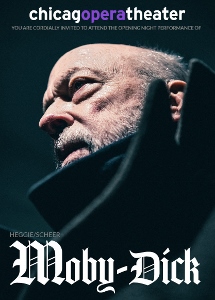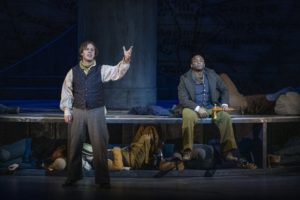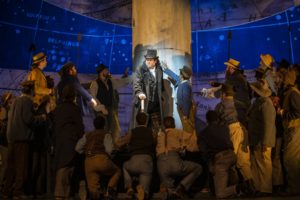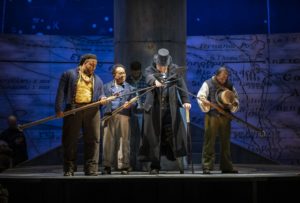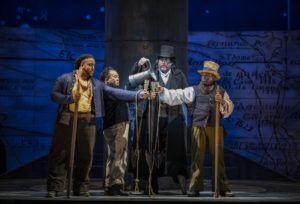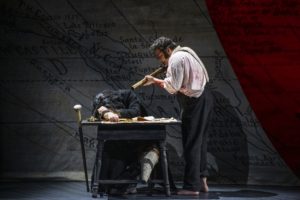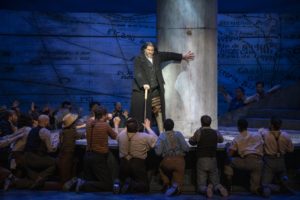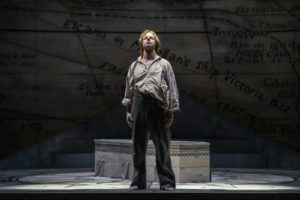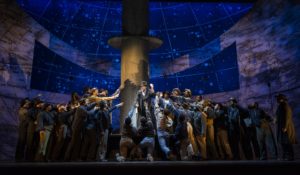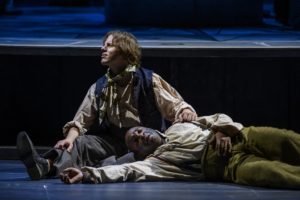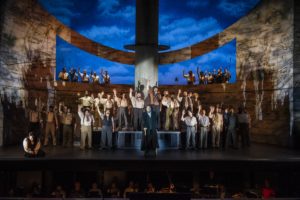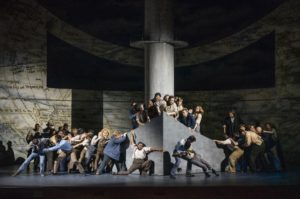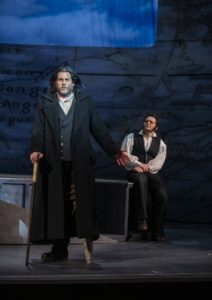THE WHALE WINS
There’s only one more performance — on Sunday at 3 at the Harris Theatre — of Chicago Opera Theater’s awesomely ambitious Moby-Dick, a nearly-three-hour 2010 epic with music by Jake Heggie and a libretto by Gene Scheer. As much an exercise in mounting hubris and ironclad obsession as was Captain Ahab’s pursuit of the “white whale,” this mammoth enterprise is a co-production of Utah Opera, Pittsburg Opera, San Jose Opera and Grand Teatre del Liceu.
Their impressive collaboration richly captures the drive and grasp of Herman Melville’s 1851 masterwork. (Its power comes from Melville’s own seafaring experience and the actual capsizing of the whaleship Essex in 1820, rammed and sunk by one very angry mammal.)
At its best Kristine McIntyre’s massive staging, which features 52 performers rampaging around Erhard Rom’s vast set (an astronomical observatory whose telescope becomes the whaleship Pequod) does full justice to the monomaniacal and self-destructive quest of a crippled captain. Transformed into a killing machine by an unwanted amputation, Ahab is out to harpoon the legendary albino cetacean who took his leg. An all-revealing cyclorama registers the converging clouds and lonely stars seen from the main deck. A twirling capstan suggests the “Nantucket sleighrides” where the whaleboats sought to weaken the sperm whale before towing it in.
The surging score works overtime to contrast both the dehumanizing ferocity of Richard Cox’s paranoid and persecuting Ahab, who will refuse to aid another captain searching for his 12-year-old son lost at sea, and the unlikely and affecting friendship between Greenhorn (ardent tenor Andrew Bidlack later identified as Ishmael) and the South Sea islander and prince Queequeg (Vince Wallace), one of nature’s noblemen and inevitably Greenhorn’s salvation.
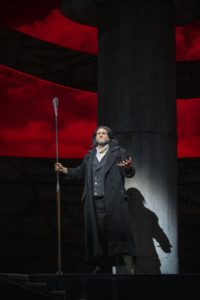 Caught between these poles is the beleaguered crew of the doomed Nantucket-based Pequod — like the very ambivalent first mate Starbuck (burly Aleksey Bogdanov), the salt-of-the-earth bosun Stubb (Nicholas Ward), and the plaintive cabin boy Pip (Summer Hassan): “Her” innocence contrasts with everything on this ship of fools heading for Davey Jones’s locker.
Caught between these poles is the beleaguered crew of the doomed Nantucket-based Pequod — like the very ambivalent first mate Starbuck (burly Aleksey Bogdanov), the salt-of-the-earth bosun Stubb (Nicholas Ward), and the plaintive cabin boy Pip (Summer Hassan): “Her” innocence contrasts with everything on this ship of fools heading for Davey Jones’s locker.
Mainly faithful to its sprawling source, this Moby-Dick conveys the doldrums that halt their passage, the huge burning vats that boil out the blubber and the whale oil, and the storm that Ahab characteristically defies, its St. Elmo’s Fire lighting up sails and masts. Strangely sympathetic to Ahab’s crazy crises despite their understandable apprehension, the male chorus at times suggest enablers in collusion. In any case they supply all the spectacle that a classic adventure demands.
The sole drawback is the overlong second act. It’s full of static speculation about the danger of playing God and the lives they left behind. It equally indulges in debates that pit the ship’s mercantile mission against one crackbrained zealot’s hunt to the death (whose and how?). Inevitably and enervatingly, the spirited score and metaphysical text bog down in an expressionistic overkill. You find yourself really eager to hear the cry “Thar she blows!”
None of this detracts from the enthralling immediacy of story and song, musical mastery that turns both this massed ensemble and superb orchestra (conducted by Lidiya Yankovskaya) into forces of nature in their own right. C.O.T.’s labor of love abounds in thinking thrills, unforgettable stage tableaux, and monumental energy that always rises to Melville’s occasions. Just alone it’s enough how the white whale’s giant eye can accuse and haunt. He and Ishmael survive for reasons that captivate and intrigue.
Moby-Dick
Chicago Opera Theater
Harris Theater, 205 E. Randolph
ends on April 28, 2019
for tickets, call 312.704.8414
or visit Chicago Opera Theater
for more shows, visit Theatre in Chicago
